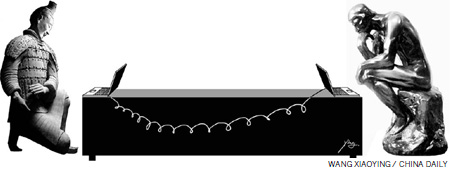A great opportunity for China and EU

This year is the European Union-China Year of Youth. Aimed at strengthening and expanding people-to-people contacts, intercultural dialogue, mutual understanding and cooperation, it offers opportunities for young Europeans and Chinese to meet, exchange ideas and learn from each other in 2011 and beyond. Last month saw the successful launch of this celebratory year in Brussels, capital of the EU.
This excellent initiative promises to be one of the most important areas of cooperation in the 35-year history of our formal relationship, not to mention the hundreds of years of contacts between Europe and China.
Many millions of young Europeans and Chinese, even well-educated university graduates, find themselves struggling in the current employment market or are in some way anxious about the future. And indeed many of those lucky enough to have jobs find themselves trapped in low-paid employment, worrying about housing and mortgage payments, expensive healthcare, rising cost of living and the seeming lack of opportunities to make a better life for themselves and their families. Young people are increasingly stressed about so many different aspects of their lives.
In organizing this year-long event, we need to be as inclusive as possible of all our young people, no matter their educational background or level of social standing. We should also try to answer the question on the lips of many young people, both European and Chinese: What difference can the EU-China Year of Youth make to my life?
I think that the best answer to this question is "opening up to each other". Knowing more about each other is the best way to reinforce peaceful and respectful relations and to build a better future in what is no longer a vast unexplored planet, but an increasingly familiar global village in which we are all close neighbors.
We have identified a number of highly interesting areas for future joint work: voluntary activities, active involvement in society and youth work, healthy lifestyles, creativity and international vision, employment and entrepreneurship.
The younger generation today has one great advantage that even people of my generation, just 20 years ago, did not have: They have the ability to connect with other young people all over the world instantly through the magic of the Internet, social media and mobile communication.
The first great youthful connector between Europe and China, Marco Polo, left Venice in Italy in 1271 as a young man of just 17 years old and it took him more than three years to reach Beijing. Today, a young Chinese in downtown Shanghai can connect with a friend in rural Hungary in the blink of an eye.
But despite all the great technological advances, many young Europeans and young Chinese still know very little about each other.
Language is of course the first obstacle that comes to mind, but there are plenty of young Chinese with sufficient knowledge of English and other European languages, as well as an increasing number of young Europeans with some knowledge of Chinese to facilitate more contact between each other.
Currently, there are 210,000 Chinese students in Europe, many through the EU's well-known Erasmus Mundus study program, and 25,000 European students in China. This is already a good start, but we are hoping to expand contacts between students this year through the twinning of schools. Our target is to have 100 schools on each side participating in this program.
A much bigger challenge seems to be how to overcome social and cultural barriers and misperceptions that we have about each other. This we can only achieve by encouraging more people-to-people contacts between our peoples, especially between our youth. I would say that most young Europeans don't know much about the daily lives and concerns of young Chinese and vice-versa.
This year, we will hold a series of events both in China and Europe, such as concerts, cultural events, film festivals, art exhibitions and competitions, debates, social events, student events, and open days of EU and Chinese embassies in Europe and China. All of these will be open to the public and I encourage young people to participate in them as much as possible.
In his famous essay, Young China, Qing Dynasty (1644-1911) scholar and one of China's first democrats Liang Qichao wrote: "If the youth are wise, society will be wise; if the youth are rich, society will be rich; if the youth are strong, society will be strong; if the youth are independent, society will be independent; if the youth are free, society will be free; if the youth progress, society will progress."
Success can only be measured in results. It would be wonderful to think that in the years to come, the result of this first EU-China Year of Youth will lead more marriages between Europeans and Chinese. Yes, the EU-China Year of Youth is a matchmaking exercise, but not of the traditional kind.
The future will see more EU-Chinese joint enterprises, joint patents, joint innovations by EU and Chinese scientists, technology developed by EU and Chinese researchers that combats climate change, Chinese and Europeans securing peace together in trouble spots around the world, even exploring the vast universe of space together. There is no limit to what the next generation of great European and Chinese minds can accomplish working together.
The author is the European Union's ambassador to China.
 0
0 







Go to Forum >>0 Comments